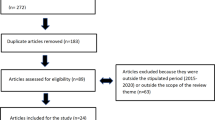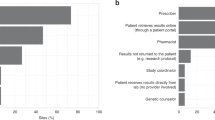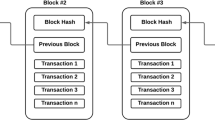Abstract
Pharmacogenomics (PGx) test results are returned variably across healthcare settings, which can lead to challenges particularly when results require immediate intervention to avoid adverse consequences. While several return of result models exist in literature, a standard-of-care has not been established. We propose a model to safely return PGx results in the context of scaled and sustained PGx testing: an institutional protocol to integrate new PGx results into patient care.
This is a preview of subscription content, access via your institution
Access options
Subscribe to this journal
Receive 6 print issues and online access
$259.00 per year
only $43.17 per issue
Buy this article
- Purchase on SpringerLink
- Instant access to the full article PDF.
USD 39.95
Prices may be subject to local taxes which are calculated during checkout

Similar content being viewed by others
Data availability
Data sharing is not applicable to this article as no datasets were generated or analyzed during the current study.
References
Ho TT, Gift M, Alexander E. Prioritizing pharmacogenomics implementation initiates: a survey of healthcare professionals. Per Med. 2022;19:15–23.
McInnes G, Lavertu A, Sangkuhl K, Klein TE, Whirl‐Carrillo M, Altman RB. Pharmacogenetics at scale: an analysis of the UK Biobank. Clin Pharmacol Ther. 2021;109:1528–37.
Cavallari LH, Pratt VM. Building evidence for clinical use of pharmacogenomics and reimbursement for testing. Clin Lab Med. 2022;42:533–46.
Relling MV, Klein TE. CPIC: clinical pharmacogenetics implementation consortium of the pharmacogenomics research network. Clin Pharmacol Ther. 2011;89:464–7.
Thorn CF, Klein TE, Altman RB. PharmGKB: the pharmacogenetics and pharmacogenomics knowledge base. Methods Mol Biol (Clifton, N.J.). 2005;311:179–91.
Empey PE, Pratt VM, Hoffman JM, Caudle KE, Klein TE. Expanding evidence leads to new pharmacogenomics payer coverage. Genet Med. 2021;23:830–2.
Centers for Medicare & Medicaid Services. MolDX: Pharmacogenomics Testing. 2023; Available at: https://www.cms.gov/medicare-coverage-database/view/lcd.aspx?lcdid=38337&ver=10&keyword=pharmacogenomics&keywordType=starts&areaId=all&docType=NCA,CAL,NCD,MEDCAC,TA,MCD,6,3,5,1,F,P&contractOption=all&sortBy=relevance&bc=1.
Dunnenberger HM, Biszewski M, Bell GC, Sereika A, May H, Johnson SG, et al. Implementation of a multidisciplinary pharmacogenomics clinic in a community health system. Am J Health Syst Pharm. 2016;73:1956–66.
Bain KT, Schwartz EJ, Knowlton OV, Knowlton CH, Turgeon J. Implementation of a pharmacist-led pharmacogenomics service for the Program of All-Inclusive Care for the Elderly (PHARM-GENOME-PACE). J Am Pharm Assoc. 2018;58:281–289.e1.
Mitaly S, Wright J, El Melik R, Matey E. Pharmacists’ role in supporting the return of over 10,000 preemptive pharmacogenomics results: The Mayo Clinic experience. Am J Health Syst Pharm. 2023;80:1733–42.
Kelly MA, Leader JB, Wain KE, Bodian D, Oetjens MT, Ledbetter DH, et al. Leveraging population-based exome screening to impact clinical care: The evolution of variant assessment in the Geisinger MyCode research project. Am J Med Genet C Semin Med Genet. 2021;187:83–94.
National Human Genome Research Institute. Electronic Medical Records and Genomics (eMERGE) Network. 2024; Available at: https://www.genome.gov/Funded-Programs-Projects/Electronic-Medical-Records-and-Genomics-Network-eMERGE.
Kullo IJ, Haddad R, Prows CA, Holm I, Sanderson SC, Garrison NA, et al. Return of results in the genomic medicine projects of the eMERGE network. Front Genet. 2014;5:50.
Uber R, Wright E. Pharmacogenomics implementation and multidisciplinary genomics collaboration: Real-world experience from Geisinger. Am J Health Syst Pharm. 2022;79:1038–41.
Uber R, Hayduk VA, Pradhan A, Ward T, Flango A, Graham J, et al. Pre-emptive pharmacogenomics implementation among polypharmacy patients 65 years old and older: a clinical pilot. Pharmacogenomics. 2023;24:915–20.
CPIC. Guidelines. Available at: https://cpicpgx.org/guidelines/.
U.S. Food and Drug Administration. Table of Pharmacogenetic Associations. 2022; Available at: https://www.fda.gov/medical-devices/precision-medicine/table-pharmacogenetic-associations.
Acknowledgements
This research is supported by a grant from the Pennsylvania Department of Health (SAP# 4100088547).
Author information
Authors and Affiliations
Contributions
RU, VAH, AF, TW, LW and EAW all contributed substantially to the conception and design of the study, and always provided a critical review of this manuscript during its writing. RU, VAH, AF, TW, LW and EAW all also provided final approval of this manuscript version to be published and agree to be accountable for all aspects of the work in ensuring that questions related to the accuracy or integrity of any part of the work are appropriately investigated and resolved. RU as first author was directly responsible for the initial draft of this manuscript.
Corresponding author
Ethics declarations
Competing interests
The authors declare no competing interests.
Additional information
Publisher’s note Springer Nature remains neutral with regard to jurisdictional claims in published maps and institutional affiliations.
Supplementary information
Rights and permissions
Springer Nature or its licensor (e.g. a society or other partner) holds exclusive rights to this article under a publishing agreement with the author(s) or other rightsholder(s); author self-archiving of the accepted manuscript version of this article is solely governed by the terms of such publishing agreement and applicable law.
About this article
Cite this article
Uber, R., Hayduk, V.A., Flango, A. et al. An innovative model for pharmacogenomics critical results identification and intervention. Pharmacogenomics J 25, 25 (2025). https://doi.org/10.1038/s41397-025-00385-y
Received:
Revised:
Accepted:
Published:
Version of record:
DOI: https://doi.org/10.1038/s41397-025-00385-y



